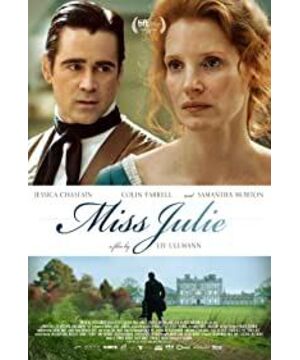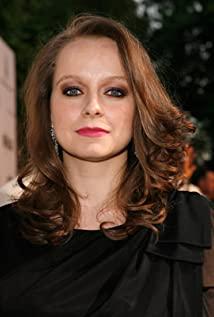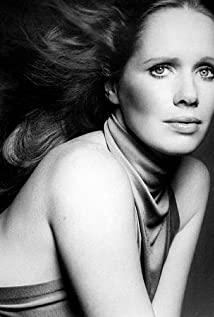Liv Uman's work "Miss Julie" Post-View Symposium Minutes / Organized by Fan Daming / Time: 15:46-16:22 pm, June 3, 2016 (Friday) Venue: Henglu Art Museum, No. 202 Nanshan Road, Hangzhou The ground floor lecture hall (the scene after the viewing of "Miss Julie" by Liv Uman in Henglu Art Film Bar) Participants: (Preface) Fan Daming, Wang Xiling, Li Ze, Sun Fengfeng, Zhang Wumei, Wang Yulin, Chen Hua, Lu Xiaoli, Lei Yaling, Lu Zhongpei, Peng Mingming (viewers: Fu Peiying, Zhang Xiaoyun, Liu Guiliang, Zhang Luping, Sun Jijun, Ni Yunxia, Fan Dayin, Ji Boqing, Weng Xiliang, Wang Yuefang, Jiang Tianhong, Zhu Songfa, Zhou Hongze, Zhang Yusu, etc.) Moderator: Fan Daming Records: Sun Fengfeng
"Miss Julie" is one of August Strindberg's representative works. This play has been brought to the screen many times. , I took the "Miss Julie" I just watched by mistake, and I failed to bring the DVD "Babette's Feast" that I should have brought. There is no way. Today, I watch "Miss Julie" which was originally scheduled to be screened on July 1, and "Babette's Banquet" can only be changed to July 1. "Miss Julie" was originally a famous stage play, one of the representative works of August Strindberg (1849-1912), the founder of modern Swedish literature. The play has been brought to the screen many times. In 1951, the film of the same name directed by Alf Sjoberg won the Palme d'Or at the 4th Cannes Film Festival. It is said that the film was the first attempt of the film stream of consciousness technique. Today's film is the latest work in 2014. The director is Swedish film master Ingmar Bergman's former starring collaborator and his live-in wife. Because it was adapted from a stage play, the film still retains traces of the stage play. The conflict between the plot and the drama is mainly reflected through the dialogues of the characters. Perhaps the film was originally shot to be deliberately faithful to the original work. The film is longer, 130 minutes. There are only three characters. So, let's patiently watch a play by these three people (this is the opening remarks before the host watches the film). The whole film basically retains the classic "Three Uniforms" drama structure of Western drama, Fan Daming: the story ends with Miss Julie's suicide. If the symbolic opening part of the film, which depicts Miss Julie walking out of the castle house and entering the garden in her childhood, which is similar to the prologue, the whole film basically retains the classic "three in one" dramatic structure of Western drama, and its entire plot is limited to In the castle at the same location, it happened at the same time period from midsummer night to early morning - some of the shots in the film do not seem to us to feel like night, maybe it is the Nordic countries near the Arctic Circle, or it is white night; That is, the same three: Miss Julie, daughter of the castle owner, John the groom, and Catherine the maid. The arrival of the people outside the castle mentioned in the play, and the ending of the play that Miss Julie's father is going home, are all virtual performances that only hear the sound but do not see the shadow. I think this is the only way to keep the original work. "Three in one" classic structure. I won't say much. Next, I would like to ask Mrs. Wang to talk about her experience of watching the film first.
The film emphasizes social class differences, and the author's position is to stand on the side of Miss Julie Wang Xiling: The original playwright Strindberg is famous, but I don't really agree with him. It seems that he was not introduced before the "Cultural Revolution". Only after the new period can the real translation, introduction and evaluation of his literary and dramatic works. The author ripped apart people's hearts bloody, and the author in his later years was also a bit mentally ill. Generally speaking, the poor are always envious of the rich. There was no revolution in Sweden in the 19th century, and there was no hope for the poor. John Groom longed for a life of the bourgeoisie and had fantasies, and later he managed to control himself as much as possible, thinking that Catherine was his good woman; and Miss Julie was just playing with men. Miss Julie had seduced the groom many times, but the latter was very practical. The film emphasizes that there are class differences in society, and that people of different classes have different understandings of human nature. The author's position is on Miss Julie's side. You see, in the last picture of her death, lying in a pond, just like the death of Ophilia in "Hamlet", she died beautifully, and she had great sympathy for her. The film has a very deep analysis of human nature. Miss Julie's death has become a victim of beliefs and concepts. Li Ze: The film has a very profound analysis of human nature. Miss Julie and the groom have not been able to do anything later. Because of belief, people themselves cannot control their own destiny. Miss Julie's death has become a victim of beliefs and ideas. The nobles and the poor have different manifestations of human nature, which are inseparable from their upbringing, and the surrounding environment will affect the manifestation of human nature.
The groom went from admiration to possession and reaching the pinnacle of desire for Miss Julie to Sun Fengfeng who experienced a process: The groom went through a process from admiration to possession and reaching the pinnacle of desire for Miss Julie. The film shows him here. The psychological contradiction unfolds step by step, and the performance is very good. The groom actually took advantage of Miss Julie's desire to go her own way, which of course didn't work out. Julie's family environment is the cause of her mental problems. Miss Julie desperately wants someone to love her, but because of her cognitive flaws, she is deceived and taken advantage of by the groom, and even ends up dying at the groom's suggestion. Human nature is fragile and often cannot withstand temptation. The groom wants to take the opportunity to get a handful of Zhang Wumei: The film tells us that human nature is fragile and often cannot withstand temptation. The groom wanted to take the opportunity to grab a handful. We cannot look at problems without leaving the times and circumstances at that time.
Miss Julie looks decadent, she is not pure Wang Yulin: Miss Julie in the film looks decadent, she is not simple. The film expresses the complexity of human nature. The relationship between Miss Julie and the groom is like the relationship between Sister Lin and Jiao Da Jia in "A Dream of Red Mansions". This is easy to understand - Da Jiao will not love Sister Lin. Miss Julie wasn't really in love with grooms either. The groom's ambition is getting bigger and bigger, and his heart is getting more and more cruel. Chen Hua: Miss Julie's suicide is an illusion. She is noble, growing up after her mother's death, and has a flawed character, it's obvious. She likes to command others, and she is not really in love with grooms. Her suicide was for the family's reputation. Since childhood, the groom has longed for the life of the rich and understood his position. Later, his ambition became more and more cruel, and his heart became more and more cruel, for example, he slaughtered the canary. Lu Xiaoli: The film fully expresses the complexity of human nature - the groom is a poor man, and the poor have noble moments; Julie is an aristocrat, and the noble have rogue moments.
Miss Julie chose to commit suicide, which was determined by her noble status; it was the groom who led her to suicide Lei Yaling: Why did Miss Julie choose to commit suicide? It is determined by the status of the nobility. First, she seduced the groom, the groom used her to achieve and satisfy his desires, and finally his intentions were seen through by Miss Julie. Because of being used by the groom, Miss Julie thought she was dirty, and she didn't even know what she was going to do in the end! Apparently, it was the groom who led her to suicide again.
Miss Julie's failure represents her failure to confront the social system and traditional ideas, which is where her tragedy lies. formed in the family and social environment; but even with her noble origin and blood, in the specific social environment at that time, she could not do whatever she wanted—she still must still be accepted by her. Various constraints and constraints in the aspects of educational thought, religious belief, and traditional morality and ethics of the aristocracy. Since she ended up having an affair with the groom that night, in order to escape this "crime", she subsequently attempted to elope with the groom, but these possible actions were in fact just wishful thinking or impulsive thoughts that must eventually come to nothing And ended in failure. This failure represented her failure to fight against the entire social system and traditional concepts, and her suicide became the cost and price that she had to pay for her failure of personal resistance. She was just a sacrifice. Obviously, her confrontation and challenge can only be small or weak compared to the enormous traditional pressure of this social system, and she is also isolated and helpless. So her failure is inevitable. This is the tragedy of Miss Julie. Judging from the performance of the film, not only did she not get a little help from the maid Catherine in the end, even the groom himself, who had made love to her, was not indifferent to her various demands, but it was nothing but social entertainment. Said he would not have any positive response either. During this process, Miss Julie herself has actually gone from a person with a basically normal body and a basically healthy spirit to an absolute mental breakdown. At this time, there is a contrast shot in the film that is unforgettable: on the one hand, Zhu Li wants to elope. Miss Li, who represented nobles and powerful people, was unkempt and had blood on her face; on the other was Catherine's maid who was about to go to church, and she represented commoners and servants, but she was neatly dressed and looked full of vigor and blood. How did Miss Julie fall to such a tragic level! It should be said that the motivation of Miss Julie's suicide, of course, has its inherent genes, but from the film, she is more like a person who has fallen into a hypnotized state, completely to the point of losing any self-control. The film is the final result of Miss Julie's suicide, a mournful lament to the entire society at that time and to our audience. The social criticality of Strindberg's original script is also the criticality of this film is manifested here. This work reminds me of the famous Chinese drama writer Cao Yu's masterpiece "Thunderstorm", the image of Miss Julie, from the spiritual work Qualitatively speaking, it is indeed very close to Fan Yi, the also crazy neurotic female character in "Thunderstorm". June 9-11, 2016 Organizer's Note: This summary is the 122nd summary of the discussion since the establishment of Hangzhou Henglu Art Film Bar.
View more about Miss Julie reviews











